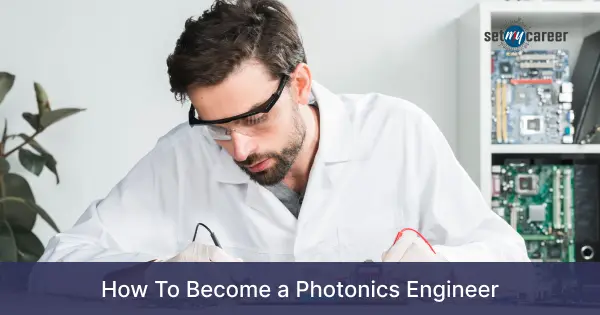
Published By Team Setmycareer on Sep 13, 2023 | Updated on 02-11-2023
This guide will help you understand the steps and skills needed to become a Photonics Engineer. It outlines the extensive education, licensing requirements, and experience needed to succeed in this Engineering Career

| Aspect | Career Highlights |
|---|---|
| Education | Bachelor's degree in Photonics, Physics, or Engineering. Master's or Ph.D. for advanced roles. |
| Salary | Competitive salaries, with entry-level positions typically starting around $60,000 to $80,000 per year, and experienced engineers earning six-figure salaries. |
| Basic Skills | Expertise in optics, lasers, and light-based technologies. Strong knowledge of semiconductor physics, materials science, and mathematical modeling. Proficiency in design software and simulation tools. Problem-solving and analytical skills. |
| Work Environment | Work in research and development laboratories, manufacturing facilities, or academia. Collaborate with multidisciplinary teams. Opportunities in industries like telecommunications, healthcare, and aerospace. Job may involve both office work and hands-on experimentation. |
The primary goal of photonics engineer employment is to create modern and creative materials
for healthcare, telecoms, production, and landscaping. Through the light that can split
plastics to ultra-precise lasers utilized in sensitive corrective eye surgery, photonics
researchers have made important technological advancements.
Photonics researchers
spend their working time engaged in science and technologies that will transform the image
of the planet as it is now, from designing innovative and groundbreaking photonics
technologies to carrying out research and studies.

Ready to take the next step in your career journey? Our expert career counselors are here to help you navigate your path to success. Contact us today for personalized Career Guidance and start building the future you've always dreamed of
Once you procure the required qualifications for becoming a Photonics Engineer, a myriad of options are open to you. There are multiple projects you can undertake throughout this line of work, and there are many other fields you can branch out to as well.
Photonics Engineers can opt for various fields of work in the companies listed below:
Are you feeling uncertain about your career path? Not sure which direction to take? Take the first step towards a fulfilling future
becoming a Photonics Engineer is an exciting and rewarding journey that offers limitless opportunities to explore the fascinating world of light and its applications in various fields. This guide has provided you with a comprehensive overview of the steps required to embark on this career path.
We understand that making important career choices can be overwhelming and uncertain. The decisions you make today will shape your professional journey and have a lasting impact on your life. That's why we highly encourage individuals like you to talk to our experts before making any significant career decisions. Our team of experienced career counselors is here to provide you with the guidance and support you need to make informed choices that align with your aspirations and goals.
No. 14/595, 1st Floor, Nanjappa Reddy Layout, Koramangala 8th Block, Bangalore 560095